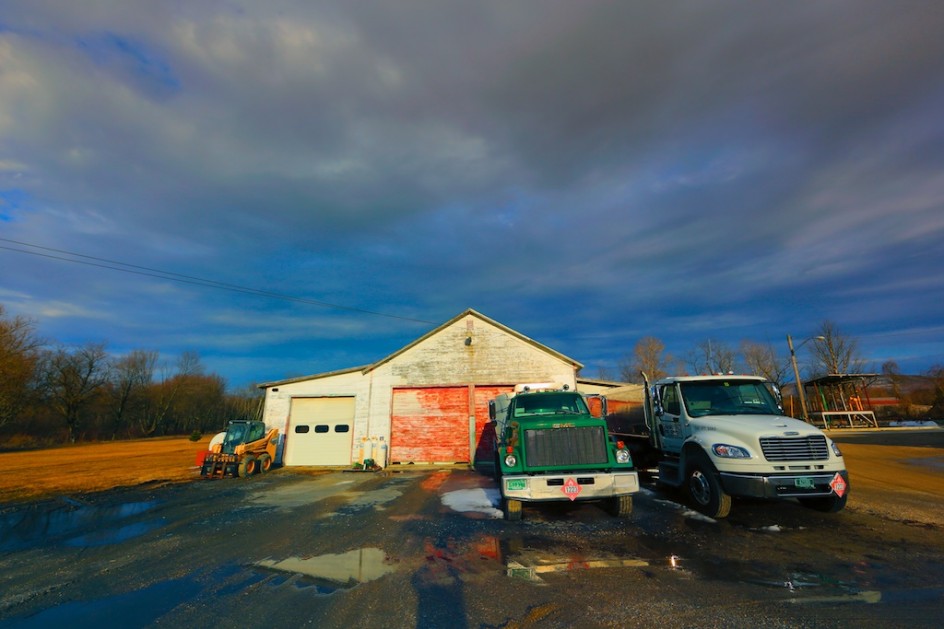
I liked the juxtaposition of Spring arriving Sunday at Haskins Fuel in Cambridge. The place has character, it evokes warm andn winter.
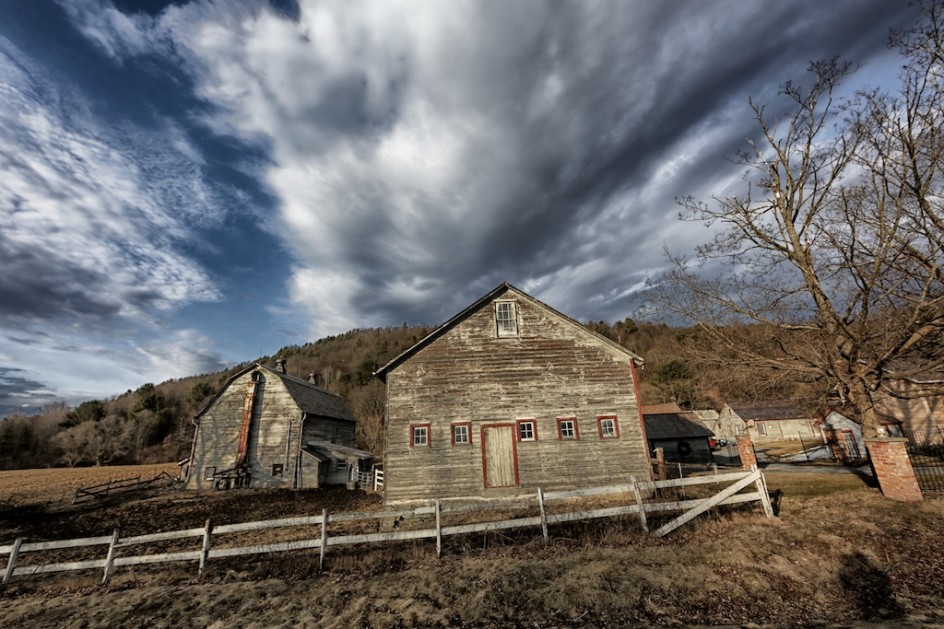
We drove to Vermont tonight to have dinner with Carol Tunney, the shamanic healer who helped me connect with a childhood surgery that frightened me and perhaps caused my years of bedwetting and night fears. I had forgotten it. I told her I was a few minutes late because I stopped to take this photo of a barn in White Creek, N.Y. I couldn’t help it, I said, I saw the light hitting the barn and I had to stop, taking photos were such a spiritual and powerful experience for me. She said she was so glad I stopped to do that, it made the dinner all the more meaningful. That is the creative spirit, generous and selfless.
I told her there was a lens I wanted to buy, but this didn’t seem to be the right time. I want a new camera also, but cannot afford that right now. We are still maintaining the cost of two farms. The lens is expensive, but a lot cheaper.
She said she thought I should buy the lens, it was important to me and my work. She said I needed to believe that I would experience more abundance. She asked if I had ever used a pendulum and she pulled one out of her bag – I love being with Carol, she is so full of life and ideas, she is a MD who quit medicine to be a shamanic healer because she wanted to heal – and handed it to me. She told me to ask the pendulum to show me yes – it moved back and forth, and then no – it moved in a circle. I asked if I should buy a lens, and it moved back and forth quite clearly. It is not in my nature to make decisions like this, although I am doing many things in my life that I have never done before, including listening to self-hypnosis CD’s and ancient musical scales for healing.
I asked the pendulum some other questions and was quite startled at how clearly and accurately it answered them. So this experience rattled me, as so many others have. Spirituality is about letting go, learning to trust. Asking for help. It is not a good time for me to buy a lens, but I am drawn to the pendulum. There was something there.
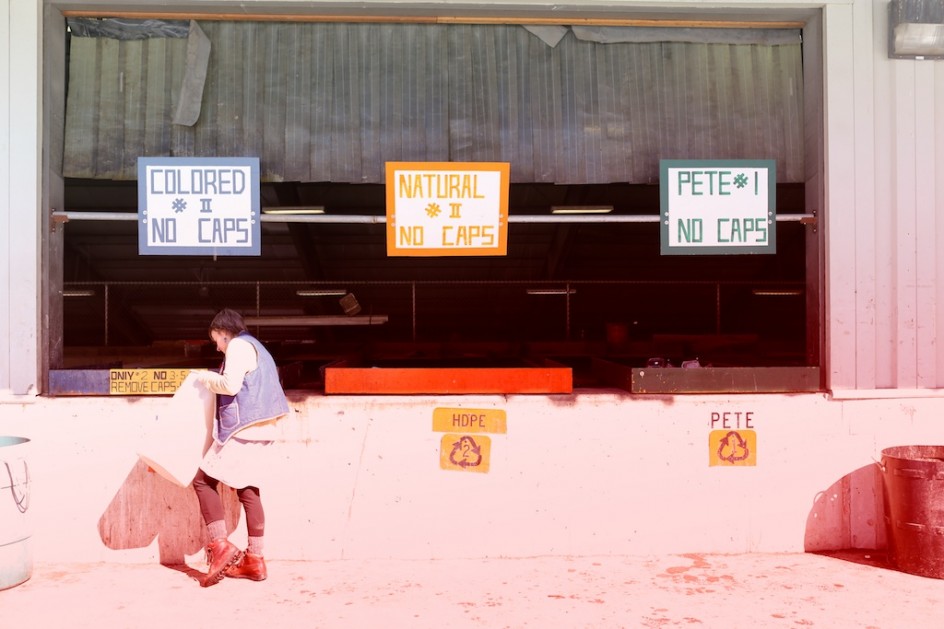
They used to call it the dump, but now it’s the Recycling Station. Marketing is everywhere. A famous photographer started e-mailing when I began putting photos up on the blog. He was dying of cancer, but was generous in his praise and criticism of my work. A real photographer, he said, can take a beautiful photo of anything, if he or she thinks about it. Maria and I go to the town dump every week with our trash stickers and we love the place. The people there are friendly, and there is a Rube Goldberg feeling about it – all kinds of bins, color codes, numbers and instructions. The place is beautiful to me in its own way and I have taken up the challenge of trying to take beautiful photos of it. The sun was strong off of the bins this afternoon and Maria came across with a bin of plastic bottles. Colored Number II. No Caps. I love the colors.
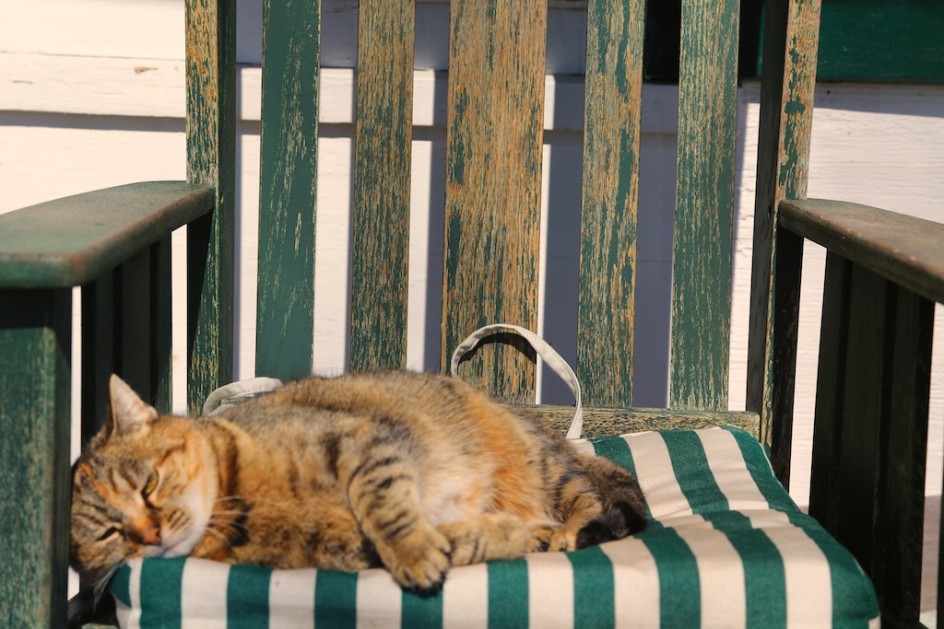
Flo is doing ok. A couple of months ago, she was living out in the fields and hiding under the front porch. Now, she is the Queen Of The Barns, lounging on rocking chairs in the sun, flirting with me, sitting in people’s laps, ensconced in her palace high atop the cozy wood shed. Maria says she has my number. This could be true.
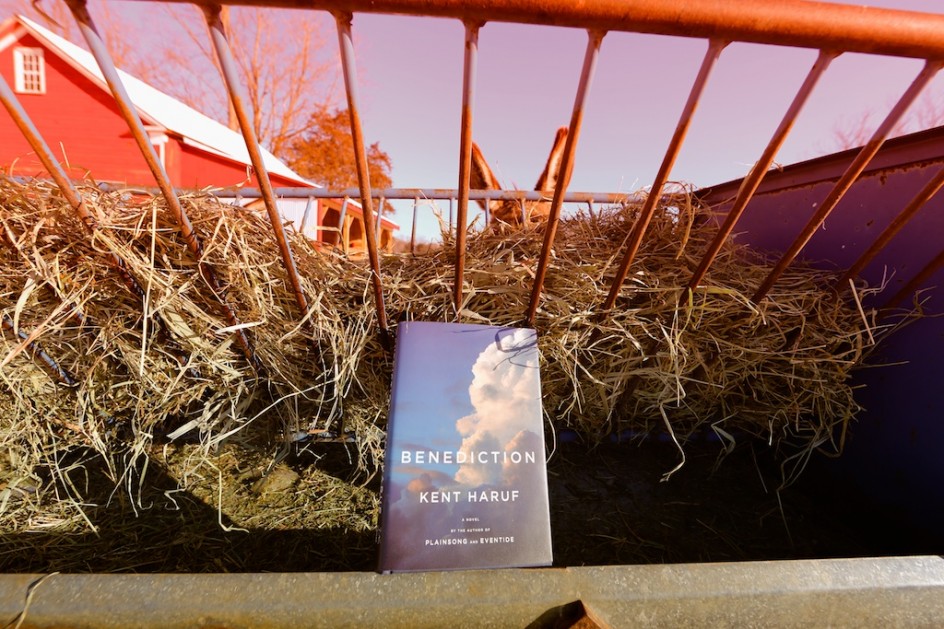
If you wish to purchase this book, please consider buying it from Battenkill Books, my local bookstore and a great independent bookstore. You can call the store at 518 677-2515, e-mail Connie Brooks at [email protected] or visit the store’s website, they take Paypal and ship anywhere. Independent bookstores are making a strong comeback against the ravages of the Corporate nation, little Davids against the online Goliaths and chains. A wonderful way to shop local, support individuality and community. Thanks to all of you who are buying books through Battenkill. It is a beautiful thing.
___
Benediction by Kent Haruf is one of the most awaited novels of the year. It is worth the wait and the hype. If a book can be an anthem, Benediction (Knopf) is just that.The book is a song really, a work of praise, devotion, even patriotism. You can close you eyes while reading it and dream of a simpler time, connections of family and community, the joys and sorrows of life. Haruf knows how to make his point – by entering the lives of simple unassuming people and walking with them through the human experience.
When Dad Lewis, the aging owner of the hardware store in the small town of Holt, Colorado is diagnosed with terminal cancer and given just a couple of months to live, he and wife Mary begin to work together to make his final days comfortable, and to settle his affairs and, of course, review his life. Dad is a simple man, an old-fashioned one, but has struggled all of his life to do the right thing, sometimes in surprising, always secret ways. The novel spans the time from Dad’s diagnosis to his death and draws in neighbors, a preacher, family and friends. There is no drama, no pyrotechnic plot twists, no serial killers slicing people up. In fact, nobody whines or complains about anything in this story. Haruf doesn’t hide from the reality of cancer, but he never lets it overwhelm his story.
Dad is not going to miraculously survive, nor is he going to prolong his life with chemo or other treatments. It is his time, he says. And he gets down to it in his businesslike and undramatic way.
If this story sounds depressing, it isn’t. Benediction is, in so many ways a celebration of life. It is precisely what it’s title suggests – a benediction for life. It’s characters are quirky, wise and compassionate. Dad has had a good life. A good business, a loving marriage, a daughter he is close too. As with most lives, there is tragedy and sorrow. And regrets. Dad’s daughter Lorraine lost her child, and Dad is estranged from his son. No one knows where Frank is, the family hasn’t heard from him in years. The characters in Benediction practice acceptance, they seem to understand that life and death are in many ways parts of the same thing and they are stoic and uncomplaining. Lorraine rushes home from Denver to help Mary take care of Dad, but the ghost of Frank hangs over Dad Lewis’s final days as he recalls the awful conflict that drove Frank away. Dad never stops hoping his son will walk in the door. But there are some things in life, he acknowledges, that you just can’t undo.
Next door, a young girl named Alice – has lost her mother and come to live with her grandmother – is drawn into the end of Dad’s life and struggles with her own memories. The town’s newly arrived preacher is trying to keep his marriage and family together and stuns his congregation with a controversial sermon that threatens his ministry. Through the book, an elderly widow and her lonely middle-aged daughter do everything they possibly can to ease the sorrows of their friends and neighbors.
If the book is sometimes sad, it is always inspiring. The people of Holt do not ever give up on life, they just keep on trying to live it well. It is a testament to the fullness of life, especially the sense of community woven into a small town. Benediction is an embrace of every stage of life, including it’s end. Haruf brilliantly captures the language and vocabulary of small-town America. You can feel the dusty streets, hear the people talking.
At the core of this wonderfully written book is the marriage between Mary and Dad. She loves him selflessly and the trust and connection between them is the most endearing affirmation of true love, possible at any age. It is rare for novels these days to portray the aging as anything but doddering and dying creatures. Haruf is respectful of his characters, too fine a writer for stereotypes. Reading this book, I reminded myself to let the people who love me care for me when the time comes. If is often the last great gift of the dying.
I recommend Benediction highly. A special, wonderfully written novel. You can order this book from Battenkill Books. 518 677-2515.
__